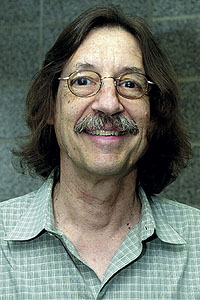![[Chronicle]](/images/sidebar_header_oct06.gif)
Vol. 26 No. 3
current issue
archive / search
contact
Past Opine interviews:
Lauren Berlant
Stephen Berry
John Boyer
David Cohen
Jerry Coyne
John Cunningham
Richard Epstein
John Frederick
Henry Frisch
Austan Goolsbee
Bernard Harcourt
Greg Jackson
Martin Marty
Martha Nussbaum
Raymond Pierrehumbert
José Quintáns
Jan-Marino Ramirez
Saskia Sassen
William Sewell
Herman Sinaiko
Geoffrey Stone
Cass Sunstein
Simon Swordy
Opine: William Sewell
 William Sewell | |
In today’s Opine, William Sewell, the Frank P. Hixon Distinguished Service Professor in Political Science and History, and the College, is of the opinion . . .
What book would you
recommend every person read and why?
Karl Marx’s Capital, Volume 1. Published nearly a century and a half ago, this remains the most penetrating book ever written about capitalism. And capitalism is still, as in Marx’s time, the great unmasterable force of contemporary history.
Who—dead or alive—is your favorite scholar, author, composer, musician, entrepreneur?
Scholar: Marx, again.
Author: George Eliot
Composer: Heinrich Ignaz Franz von Biber
Musician: Murray Perahia
Entrepreneur: I don’t have a favorite entrepreneur.
Of these people, who is the one person you’d prefer to meet and converse with?
George Eliot
If you consider some of the complex moral and political issues that affect humanity, which issue/problem do you believe will never be resolved and why?
Interpersonal violence. Humans are not a peaceful species.
If politicians had to pass an exam before they were allowed to serve in a public office, what question would you add to the test?
What would you do to counter the rising disparity in income and life chances in contemporary America? I believe that increasing inequality is corroding the life of the Republic, and I’d like to see politicians pay attention to the problem. Of course, some don’t consider it a problem.
If you could choose any three University professors and give them a one-year sabbatical together to solve a problem, develop a theory or make a discovery, what task would you assign them to work on?
I’d like to get Moishe Postone, Saskia Sassen, Jean Comaroff and John Comaroff (four people, actually) to work together on the social dynamics of contemporary capitalism.
The University has many traditions, some academic, such as the Humanities Open House and the Aims of Education Address, and some more recreational, such as the Latke Hammentash debate and the annual student Scavenger Hunt. If you were asked to create a new University tradition, what would it be?
Why not revive the Lascivious Costume Ball, which was a popular annual event in the 1970s?
Think of a renowned scholar from the past, now dead, who added great value to your area of study. Who is this person, and what do you believe this person would think of the advances that recently have been made in this area?
E. P. Thompson, the English social historian and social critic who wrote The Making of the English Working Class, probably the most influential historical work of the last half-century. He would probably be appalled at how little historians are now interested in poor peoples’ struggles.
But if he were alive today, I suspect he’d be too busy opposing British participation in the Iraq war and denouncing the obscenities of the “war on terror” to spend much time worrying about the moribund state of labor history.